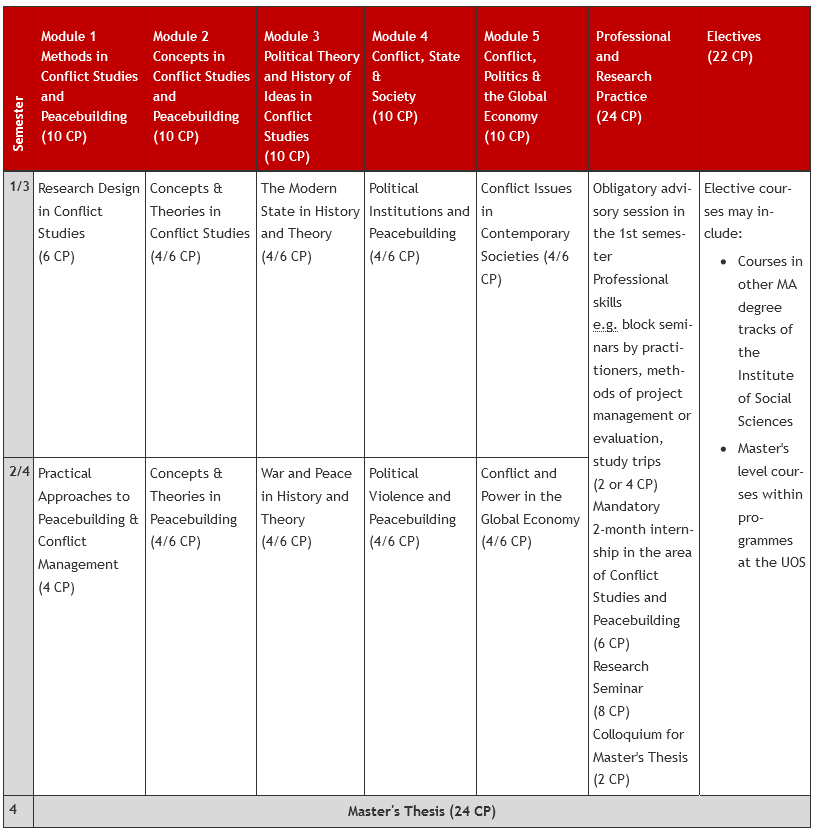Hauptinhalt
Topinformationen
The study program
The program is divided into five compulsory modules (50 CP) (M1: Methods in Conflict Studies & Peacebuilding, M2: Concepts in Conflict Studies & Peacebuilding, M3: Political Theory & History of Ideas in Conflict Studies, M4: Conflict, State &Society, M5: Conflict, Politics & the Global Economy), a unit for professional and research practice (24 CP) and a free elective unit (22 CP). The program concludes with a Master’s thesis (24 CP).

Modules
Module 1: An introductory course (1) reviews the core elements of the academic research process and (2) conveys the methodological specifics of conflict studies. The second part of the module introduces students to practical approaches to conflict management and peacebuilding. Practitioners teach students about strategies and instruments in support of peace processes, conflict mediation, violence prevention and post-conflict reconstruction.
Module 2: The courses complement the methodological introduction in module 1 with a conceptual and theoretical introduction to conflict studies and peacebuilding. This module focuses on clarifying key concepts of conflict studies, the causes of various forms of organized violence, theoretical explanations and empirical findings on the dynamics, the termination and consequences of violent confrontations as well as on conflict management and peacebuilding.
Module 3: The courses in this module focus on the semantics and the modes of thought and argumentation in political theory and the history of ideas with regard to two key thematic areas of the MA CSP: the role of the state and the thought on war and peace. The module explores and addresses the problems raised by the central authors and streams of thought with regard to their timeliness and their applicability to current issues in conflict studies.
Module 4: The objective of the module is to expand on selected topics in the overarching research area of state-society relations: What role do institutional factors such as regime type, repression or state capacity play in post-war peacebuilding? What effect do concrete peace efforts such as mediation or transitional justice have? What are the long-term effects of armed conflict on social cohesion or the persistence of political violence within a society?
Module 5: The seminars in this module address contextual factors and global framework conditions, focusing on conflicts of interest and negotiation processes in selected policy areas and the global economic (power) structures in which conflicts are embedded. The objective is to show students how conflict studies can be applied beyond violent conflict and to give them the opportunity to address currently relevant thematic areas.
Electives: The free electives enable students to specialize flexibly and across disciplines. Potential courses include, for example, seminars and lectures in related Master’s programs in the Social Sciences and Humanities (especially “European Governance: Market, Power, Community” and “International Migration and Intercultural Relations”) as well as courses in Law, Economics or History.
Professional and research practice: This area enables students to develop their skills in integrating theory/research and practice/application. Encompassing 24 CPs, it has a much broader scope than similar units in comparable purely research-based Master’s programs. It comprises courses that provide students with practical skills for the peacebuilding job market, (e.g. project management), study trips, block seminars by practitioners, and an internship.
The language of instruction is English. However, following individual agreements with the supervisors, oral exams, research papers and the MA thesis may also be completed in German.
Additional information:

